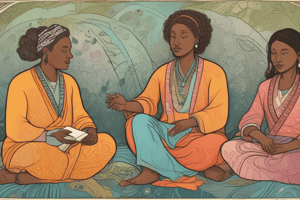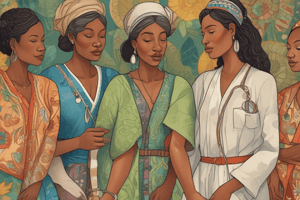Podcast
Questions and Answers
What does high Uncertainty Avoidance indicate about a culture's attitude towards change?
What does high Uncertainty Avoidance indicate about a culture's attitude towards change?
- People prefer established systems and resist changes. (correct)
- People are indifferent to changes in life.
- People embrace new changes readily.
- People often seek to innovate frequently.
How do values influence a culture's norms?
How do values influence a culture's norms?
- Values shape what a culture considers acceptable behavior. (correct)
- Values determine the rituals followed by a society.
- Values dictate the material artifacts of a culture.
- Values do not have any impact on norms.
Which of the following best describes 'Power Distance' in a culture?
Which of the following best describes 'Power Distance' in a culture?
- Desire for transparency in leadership roles.
- Comfort with influencing decision-makers. (correct)
- Acceptance of a lack of authority within society.
- Willingness to accept equal power distribution.
What role do rituals play in relation to culture?
What role do rituals play in relation to culture?
What characterizes the artifacts of a society with a simple culture?
What characterizes the artifacts of a society with a simple culture?
What is the primary focus of cultural respect in health care?
What is the primary focus of cultural respect in health care?
Which of the following is NOT a component of culture as defined in the information?
Which of the following is NOT a component of culture as defined in the information?
According to Hofstede's framework, what does the dimension of Individualistic vs. Collectivistic describe?
According to Hofstede's framework, what does the dimension of Individualistic vs. Collectivistic describe?
How do masculine and feminine cultures differ according to the provided information?
How do masculine and feminine cultures differ according to the provided information?
What role do symbols play in communication according to the content?
What role do symbols play in communication according to the content?
What is essential for competent health care environments?
What is essential for competent health care environments?
Why are languages considered important symbols in culture?
Why are languages considered important symbols in culture?
What does cultural respect require health care providers to do?
What does cultural respect require health care providers to do?
What is a key characteristic of culture?
What is a key characteristic of culture?
Why is cultural respect considered essential in healthcare?
Why is cultural respect considered essential in healthcare?
Which of the following is NOT an element of culture?
Which of the following is NOT an element of culture?
How does culture influence patient care delivery?
How does culture influence patient care delivery?
How can healthcare systems effectively manage cultural differences?
How can healthcare systems effectively manage cultural differences?
What role do symbols play in culture?
What role do symbols play in culture?
Which aspect of cultural competence is crucial for healthcare providers?
Which aspect of cultural competence is crucial for healthcare providers?
What can be a challenge in managing cultural differences in healthcare?
What can be a challenge in managing cultural differences in healthcare?
Flashcards are hidden until you start studying
Study Notes
Culture and Healthcare
- Culture influences patient care delivery by enabling respectful and responsive service to diverse health beliefs and practices.
- Culture encompasses the literacy and characteristics of a particular group, including beliefs relating to religion, cuisine, language, and social habits.
- Cultural respect is vital for reducing health inequalities and improving access to high-quality healthcare.
Importance of Cultural Respect
- Cultural respect facilitates efficient functioning of healthcare systems by understanding diverse patient needs.
- Acknowledging cultural differences enhances healthcare provider-patient relationships and treatment adherence.
Managing Cultural Differences
- Patients may unknowingly hold customs that could jeopardize their wellness.
- Culture affects patients' reactions to illness and treatment, necessitating competent care that addresses cultural nuances.
Cultural Competence in Healthcare
- Health facilities aim to mitigate racial, economic, and ethnic disparities in meeting community health needs.
- Recognizing one's own cultural background is crucial for providing culturally competent care.
Definition of Culture
- Culture includes symbols, languages, beliefs, values, and artifacts shared by a society or group.
- It is characterized by elements such as language, thoughts, communication, actions, customs, and institutions.
Cultural Dimensions - Hofstede’s Framework
- Individualistic vs. Collectivistic: Preference for personal goals versus group goals.
- Masculine vs. Feminine: Societal norms regarding gender roles and behaviors differ based on masculinity or femininity.
- Uncertainty Avoidance: Comfort with ambiguity and change varies across cultures.
- Power Distance: Acceptance of hierarchical structures and power distribution influences social interactions.
- Time Perspective: Variations in long-term vs. short-term planning and orientation affect cultural behavior.
Elements of Culture
- Values dictate judgments on what is considered good or bad and shape cultural norms.
- Artifacts are material objects representing a culture, ranging from tools to clothing, reflecting a society's material culture.
- Symbols elicit emotional responses and facilitate communication, being essential for social interaction.
Rituals and Transmissions of Culture
- Different cultures have unique rituals that denote significant life transitions and reflect cultural norms.
- Rituals serve to transmit cultural values and norms across generations, ensuring continuity of cultural identity.
Studying That Suits You
Use AI to generate personalized quizzes and flashcards to suit your learning preferences.




